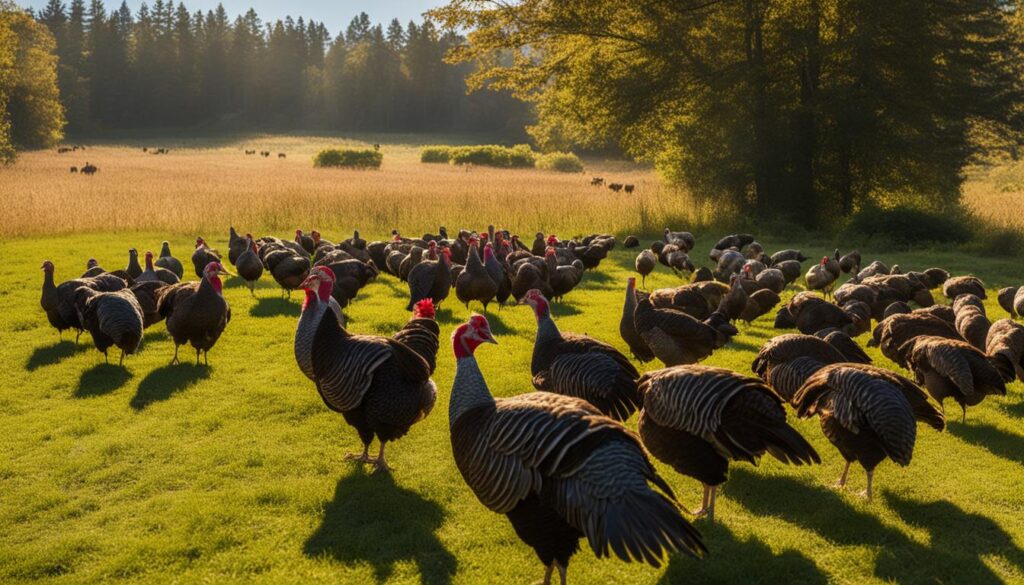Are you a hobby farmer interested in raising heritage turkeys? This comprehensive beginner’s guide will provide you with all the essential information you need to know about how to raise heritage turkeys, including tips on care, feeding, and housing.
Key Takeaways:
- Heritage turkeys have unique characteristics and require specific care and attention.
- Selecting the right heritage turkey breed is crucial for success.
- Best practices for raising heritage turkeys include proper housing, feeding, and health management.
- Understanding heritage turkey housing requirements and providing appropriate roosting areas is essential.
- A high-protein diet is necessary for the optimal growth and vitality of heritage turkeys.
Selecting the Right Heritage Turkey Breed
When it comes to raising heritage turkeys, selecting the right breed is essential to ensure a successful farming experience. There are several heritage turkey breeds to choose from, each with its own distinct characteristics and qualities.
Popular heritage turkey breeds include:
- Blue Slate
- Black Spanish
- Bourbon Red
- Royal Palm
- Narragansett
Each breed has its own temperament, appearance, and growth rate, allowing you to choose the one that best fits your preferences and farming goals. For example, the Blue Slate is known for its striking slate-gray feathers, while the Black Spanish boasts a regal appearance with its glossy black plumage.
When selecting a heritage turkey breed, consider various factors such as:
- Lifespan: Some breeds may have longer lifespans compared to others, ensuring you can enjoy their company for an extended period.
- Natural Breeding Ability: If you plan to breed turkeys naturally, consider breeds known for their successful reproduction and brooding capabilities.
- Disease Resistance: Certain heritage turkey breeds exhibit higher resistance to specific diseases, reducing the risk of health issues.
- Historical Significance: If you value preserving cultural heritage, opt for breeds with historical significance or those on the Livestock Conservancy’s Conservation Priority List.
Keep in mind that each breed has its own unique qualities, so research extensively and consider consulting experienced farmers or breeders to make an informed decision.
Best Practices for Raising Heritage Turkeys
Raising heritage turkeys can be a rewarding experience, but it requires proper care and attention to ensure the health and well-being of these unique birds. By following these best practices for raising heritage turkeys, you can provide them with the optimal conditions for growth and development.
1. Provide Adequate Housing Space
One of the first considerations when raising heritage turkeys is providing them with enough space to move around and exhibit their natural behaviors. Unlike commercial turkeys, heritage turkeys are active foragers and enjoy exploring their surroundings. A general rule of thumb is to allow at least 10 square feet of space per bird in the turkey coop or outdoor area. This ample space encourages exercise and reduces the risk of stress or aggression.
2. Offer a High-Protein Diet
A balanced and protein-rich diet is essential for the optimal growth and health of heritage turkeys. Provide them with a commercial turkey feed that contains at least 20% protein. Alternatively, you can create your own feed mix using a combination of grains, legumes, and protein supplements such as soybean meal. Ensure a steady supply of feed throughout the day and monitor their intake to prevent overeating or wastage.
3. Provide Fresh Water Daily
Just like any other livestock, heritage turkeys need access to clean and fresh water at all times. Ensure that their water containers are large enough to accommodate their size and easily accessible. Clean and refill the water containers daily to prevent bacterial growth and dehydration. During extreme heat or cold weather, consider using heated waterers or adding electrolytes to their water to maintain their overall health and hydration.
4. Implement a Biosecurity Plan
Biosecurity is essential for preventing the spread of diseases and maintaining the overall health of your heritage turkeys. Establish a biosecurity plan that includes measures such as limiting visitors to your farm, practicing proper sanitation and hygiene protocols, and quarantining new birds before introducing them to the existing flock. Regularly monitor and observe your turkeys for any signs of illness or abnormalities, and consult a veterinarian if necessary.
5. Monitor Behavior and Health
Closely monitoring your heritage turkeys’ behavior and health is crucial for identifying any potential issues early on. Regularly observe their activity levels, feed intake, droppings, and general behavior. Any changes in behavior, appetite, or physical appearance should be investigated promptly. By staying vigilant and proactive, you can address any concerns and provide timely care to ensure the well-being of your heritage turkeys.

| Best Practices for Raising Heritage Turkeys | |
|---|---|
| 1. | Provide adequate housing space |
| 2. | Offer a high-protein diet |
| 3. | Provide fresh water daily |
| 4. | Implement a biosecurity plan |
| 5. | Monitor behavior and health |
Heritage Turkey Care and Housing Requirements
When it comes to raising heritage turkeys, providing suitable housing is essential to meet their natural instincts and behaviors. These turkeys are lightweight and possess the ability to fly, so it’s crucial to create an environment that caters to their needs. Let’s explore the housing requirements for heritage turkeys and understand their roosting behavior.
Ample Space for Roaming and Exploring
Heritage turkeys thrive in an environment with plenty of space to roam and explore. They enjoy foraging and need adequate room to satisfy their natural instincts. Make sure to provide a spacious enclosure or pasture where they can freely move around, find food, and exhibit their natural behaviors.
Secure Enclosures for Protection
To ensure the safety of your heritage turkeys, it’s essential to provide secure enclosures. Turkeys are vulnerable to predators, so fencing or netting should be used to create a barrier that keeps them protected. Regularly inspect the enclosure for any vulnerabilities or signs of potential threats to ensure your turkeys’ safety.
Roosting in Trees or Elevated Structures
Understanding turkey roosting behavior is crucial for their well-being. Heritage turkeys have a natural instinct to roost high off the ground, usually in trees or elevated structures. Consider providing suitable roosting areas, such as sturdy perches or elevated nesting platforms, that mimic their natural roosting habits.
Protection from Predators
To protect your heritage turkeys from predators, take measures to secure their housing area. This can be done by adding coverings or netting to enclosures to discourage access from overhead predators such as hawks or owls. Additionally, installing electric fencing around the perimeter can deter land-based predators.

By meeting the housing requirements and understanding the roosting behavior of heritage turkeys, you can provide them with a safe, comfortable, and enriched living environment. This not only promotes their well-being but also allows them to exhibit their natural behaviors, ensuring a fulfilling and enjoyable farming experience.
Feeding Heritage Turkeys for Optimal Growth
Feeding heritage turkeys is essential to support their growth and overall health. To ensure proper development, it’s important to start turkey poults on a 28% protein feed. This high-protein diet provides the necessary nutrients for their optimal growth. As your turkeys grow, you can gradually introduce a mix of chick starter feed and higher protein feeds to meet their increasing nutritional needs.
While commercial feeds provide a solid foundation, it’s beneficial to supplement their diet with fresh greens, bugs, and other natural food sources. This mimics their natural foraging behavior, allowing them to enjoy a varied and balanced diet. Not only does this promote their overall well-being, but it also enhances the flavor and nutritional profile of the meat they produce.
When feeding your heritage turkeys, it’s important to ensure they have access to clean water at all times. Water is crucial for their digestion, nutrient absorption, and overall hydration. Regularly check their water sources to ensure they are clean and free from contaminants.
By providing a carefully balanced diet and meeting their feeding requirements, you can ensure that your heritage turkeys thrive and reach their full potential. Remember, a healthy and well-fed flock not only brings joy and satisfaction but also delivers delicious and nutritious meat for your table.
